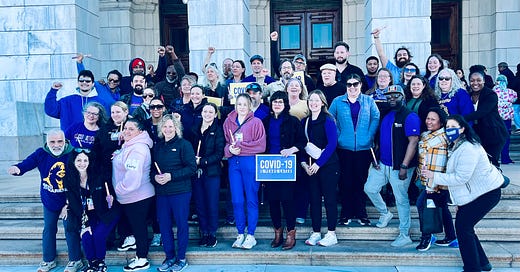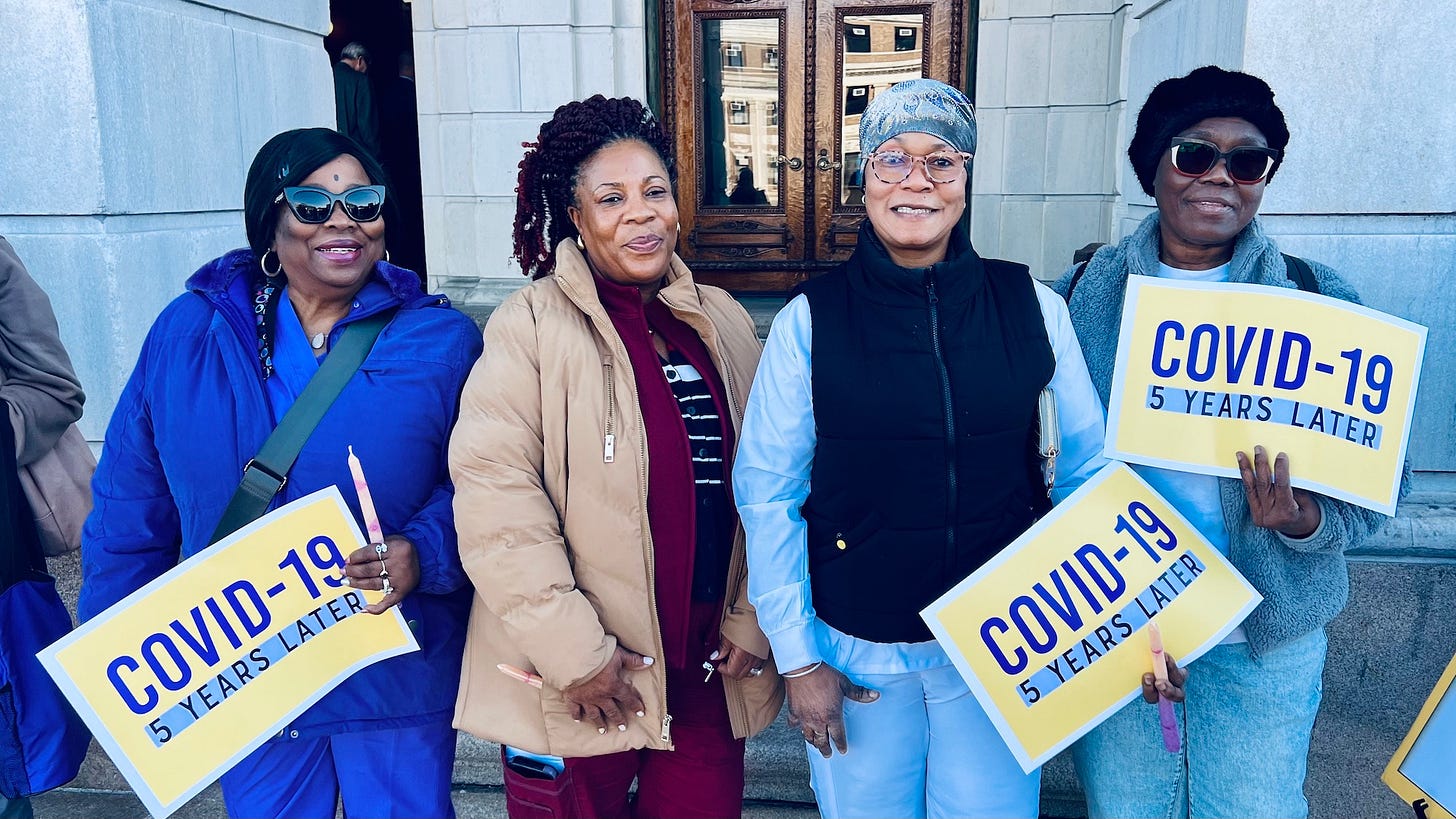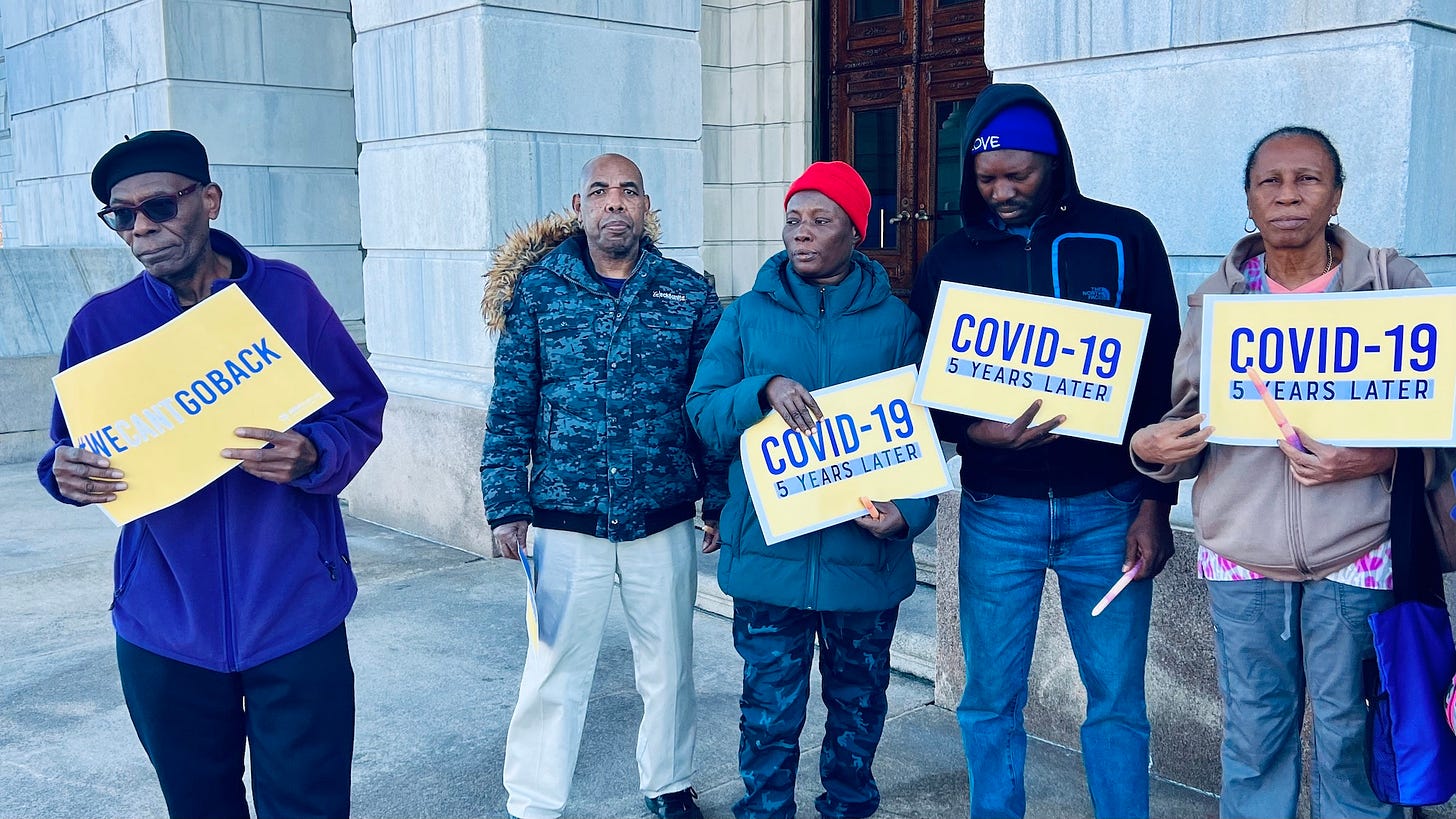Essential Care Workers and supporters hold a COVID-19 5-year Remembrance Event and call for critical state funding
“The work of healthcare heroes is far from over. We need the state to invest in the healthcare system that stands as a pillar of strength and hope for its people.”
From an SEIU press release:
Dozens of essential care workers, community supporters, and faith leaders gathered outside the Rhode Island State House to hold a special COVID-19 5-Year Remembrance Event. Participants carried photos and mementos of loved ones lost and wrote their names on a remembrance board, honoring Rhode Island’s nearly 4,500 victims of COVID-19. Frontline caregivers were lauded for their sacrifices and called healthcare heroes, but inadequate effort was made to keep them safe in their workplaces. As such, over 3,600 US healthcare workers lost their lives in the first year of the pandemic alone.
Here’s the video:
“As healthcare professionals, we were hailed as heroes in the darkest days of the pandemic,” said Dawn Williams, a Registered Nurse at Butler Hospital. “At Butler Hospital, the surge in mental health issues, compounded by the isolation and fear brought on by COVID-19, required extraordinary resilience and dedication. We provided critical support to patients grappling with anxiety, depression, and other mental health crises, often at great personal cost.”
Of Rhode Island’s nearly 4,500 COVID-19 victims, almost 2,000 were nursing home residents. The disproportionate impact on nursing homes revealed the extent to which the system was broken, exposing the impact of chronic understaffing, poor infection control and poverty wages. “When the pandemic hit, we went from low-level crisis to a full-blown catastrophe, and the bottom fell out,” said Stefania Silvestri, Registered Nurse from the Greenville Center. “There were only four staff members and 30 COVID patients and many of our residents suffered and died. It was heartbreaking - and I felt I couldn’t do enough to save them.”
The devastation wrought by the pandemic helped spur passage of The Nursing Home Staffing and Quality Care Act in May, 2021, which gave Rhode Island the highest staffing standards in the country, supplied training grants and stipulated that 80% of any funding increase equal a wage pass through to frontline staff. However, since Governor McKee signed the bill into law, the law was never enforced and, now, the Governor has proposed to gut the law by weakening staffing standards, redirecting Medicaid funding meant for frontline caregivers to managers and reducing or waiving penalties. Rhode Island ranks 39th in the country for staffing levels, and no fines have been issued to nursing homes that failed to meet standards.
In addition, Governor McKee’s budget proposes nearly $25 million cuts to hospital funding, including bypassing the required yearly Medicaid reimbursement rate. Rhode Island already offers lower hospital reimbursement rates than Massachusetts and Connecticut. This move will further pressure an already overburdened system, inevitably creating more barriers to care across the state.
For essential workers at today’s rally, honoring the memory of victims and caregivers’ sacrifice is not enough; Governor McKee and the General Assembly must support and invest in frontline staff and the healthcare system as a whole. According to a new report released by the Robert Wood Johnson Foundation and the Urban Institute, pending federal Medicaid cuts could equal more than $242 million in cuts to Rhode Island. These cuts underscore the urgency of state funding.
“The work of healthcare heroes is far from over. Chronically short staffing levels and low wages at Butler are contributing to a situation where violence against staff has become the rule, not the exception. We need the State to show its support and invest in the healthcare system that stands as a pillar of strength and hope for its people,” continued Dawn Williams.
Part of this investment must come from holding for-profit nursing home owners accountable for spending public dollars. A recent UCLA paper estimated that in 2019, for-profits could conceal 63% of their profit margins through a funneling system, indicating that only 37% of actual nursing home profits were reported to regulators. In addition, the State could raise additional revenue by adding a new 3% surtax for the top 1% in income on taxable income above $625,000, which would generate $190 million in new revenue.
Demonstrating this commitment to improving healthcare outcomes must start with listening to the voices of those most invested in the work. On February 11, a group of healthcare professionals went to his office. It delivered a letter requesting an urgent meeting with Governor McKee to discuss their healthcare concerns regarding his State budget. They are still awaiting his response.
District 1199 SEIU New England represents 29,000 health care and service workers in Connecticut, Rhode Island, and Southeastern Massachusetts. In Rhode Island, 1199 SEIU NE represents nearly 5,000 members. 1199 SEIU NE is affiliated with the Service Employees International Union (SEIU) – a union of over 2 million members nationwide.







The healthcare system is completely broken. There are places to save ,money but one of the really useful ones are on the4 table. the dilemma is that healthcare is both too expensive and underfunded. Trying to save money by funding it less just damges the system more unless the cuts in who gets money are appropriate. Mostly we have to shift money from big pharmaceutical companies to primary care, but we seem unable to make that connection. Next we have to eliminate all venture capital in healthcare. Finally we need to reduce paperwork and administrators, as well as reduce salaries of specialists.
Thank you health care workers! Essential then, and equally essential now.
Still heroes in my eyes.